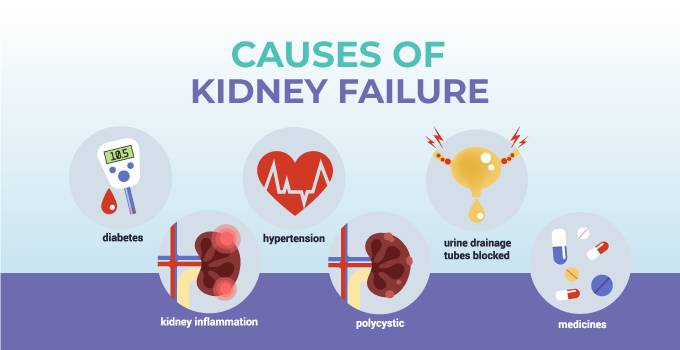Causes of Kidney Disease or failure :
Kidney disease is a medical condition that impairs the kidneys' ability to filter waste from the blood, regulate electrolyte balance, and manage fluid levels in the body. The progression from mild dysfunction to severe kidney failure can be influenced by various causes, often with long-term implications for health. Understanding the underlying causes is essential for prevention, early detection, and effective management.
Diabetes
One of the leading causes of kidney disease, particularly chronic kidney disease (CKD), is diabetes. Both type 1 and type 2 diabetes can damage the tiny blood vessels in the kidneys over time, reducing their ability to filter blood effectively. The condition is known as diabetic nephropathy, and it develops gradually, often over many years of uncontrolled blood sugar levels. Diabetic patients with poor glucose control and hypertension (high blood pressure) are at higher risk for developing kidney damage.
Hypertension (High Blood Pressure)
Hypertension is another significant cause of kidney disease. High blood pressure puts extra strain on the blood vessels, not only throughout the body but also in the kidneys. When these vessels are damaged, the kidneys lose their ability to function correctly. Prolonged, uncontrolled hypertension is one of the major causes of CKD, and if not managed, it can lead to kidney failure. Conversely, kidney disease can worsen hypertension, creating a harmful cycle of damage.
Glomerulonephritis
Glomerulonephritis is a group of diseases that cause inflammation of the glomeruli, the filtering units of the kidneys. This inflammation can be triggered by infections, autoimmune diseases, or systemic diseases such as lupus. Acute glomerulonephritis often follows infections like strep throat, while chronic glomerulonephritis may have a slower, more insidious onset. When left untreated, the inflammation can lead to irreversible damage to the kidneys.
Polycystic Kidney Disease
A genetic condition, polycystic kidney disease (PKD), causes the formation of fluid-filled cysts in the kidneys. These cysts can grow and multiply, leading to an enlargement of the kidneys and impaired kidney function. Over time, PKD can result in kidney failure. It’s a hereditary condition, passed down through families, and affects the kidney’s ability to function properly as the cysts increase in size and number.
Infections and Urinary Tract Obstructions
Certain infections and blockages in the urinary tract can also lead to kidney disease. Repeated urinary tract infections (UTIs) can cause damage to the kidneys if not treated promptly. Infections like pyelonephritis, a severe infection of the kidney, can result in scarring and eventual kidney failure. Additionally, obstructions caused by kidney stones, enlarged prostate, or tumors can prevent normal urine flow, leading to kidney damage over time.
Drug and Toxin Exposure
Overuse of certain medications, particularly nonsteroidal anti-inflammatory drugs (NSAIDs) like ibuprofen, as well as exposure to toxins such as heavy metals, can cause kidney damage. Some medications are nephrotoxic (toxic to the kidneys), especially when used in high doses or over long periods. Additionally, illegal drugs like heroin or methamphetamines can severely impact kidney function and increase the risk of kidney disease.
Autoimmune Diseases
Autoimmune diseases such as lupus and vasculitis can lead to kidney disease. In autoimmune diseases, the body’s immune system mistakenly attacks its tissues, including the kidneys. Lupus nephritis, a complication of lupus, specifically affects the kidneys and can cause inflammation and damage to kidney tissues, leading to CKD or kidney failure if not properly managed.
Age and Family History
Aging is a natural risk factor for kidney disease, as kidney function tends to decline with age. Additionally, a family history of kidney disease increases an individual’s susceptibility, particularly in cases of genetic conditions like PKD or familial glomerulonephritis.
Conclusion
Kidney disease results from a complex interplay of various factors, including chronic conditions like diabetes and hypertension, infections, genetic disorders, and lifestyle factors such as drug use or exposure to toxins. Early detection and management are critical in slowing the progression of kidney disease, particularly for individuals with high-risk conditions. Reducing the risk involves regular medical check-ups, maintaining good control over chronic conditions like diabetes, and adopting kidney-healthy lifestyle habits like reducing salt intake and staying hydrated.



No comments yet
Be the first to share your thoughts!